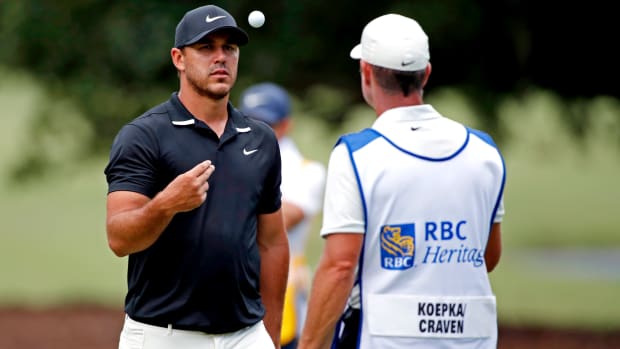Golf was the U.S.’s first pro sport to return, and so it should provide a roadmap for everybody else. Instead, it is proving just how hard this will be.
This week, four-time major champion Brooks Koepka flew to Connecticut to watch his younger brother Chase qualify for the PGA Tour’s Travelers Championship. It was a charming moment, but only a moment: By Wednesday afternoon, both Koepkas withdrew from the event because of COVID-19 concerns. Odd. I was told that by now, the coronavirus would just magically go away.
Golf was the U.S.’s first pro sport to return, and so it should provide a roadmap for everybody else. Instead, it is proving just how hard this will be. I don’t fault sports leagues for trying to re-start their seasons. I do question their ability to finish. This is going to be so much harder than most people are willing to admit.

For so many reasons, golf should be the easiest sport to stage. Players can socially distance while they compete, of course. But also: If they do test positive, there is a decent chance they can step away without infecting too many other people. And also: They can simply withdraw from the next two or three events, quarantine, and then return. Golf is not built on having all the best players compete every week.
What happens to the NBA playoffs if LeBron James tests positive after Game 2 against the Clippers? Do we really think his teammates wouldn’t get it? If Patrick Mahomes and 30 other Kansas City Chiefs test positive two days before a Sunday Night Football game, what does the NFL do? A Major League Baseball player who tests positive will likely miss—at minimum—a quarter of the super-compressed 60-game season. If half the Dodgers test positive, what do we do then? Do we just blame the Astros?
There may be answers to these questions, but there are no good answers. Golf is proof of it. Brooks Koepka is one of the best golfers in the world. He is also very smart, and he is probably be the PGA Tour star who is least likely to be swayed by peer pressure. He said bluntly last week that he expects everybody in his circle to literally remain in his circle. And yet: His caddie Ricky Elliott just tested positive for COVID-19. So Koepka and his brother have withdrawn from this week’s event.
Young potential star Cameron Champ tested positive and withdrew as well. Former U.S. Open champ Graeme McDowell withdrew because his caddie, Ken Comboy, tested positive. In the middle of last week’s event, Nick Watney withdrew after testing positive. Webb Simpson, who won that event, withdrew this week “out of an abundance of caution,” commissioner Jay Monahan said, after a family member tested positive.
Imagine Watney or Champ in a huddle or locker room with a bunch of teammates—or study hall, if they were college football players.
The recent news does not mean the PGA Tour experiment is failing. It means we have to be cautious about how we define success. Monahan said Wednesday that the Tour tried to develop a plan that “mitigates as much risk as possible … we knew it would be impossible to mitigate all risk.”
Monahan admitted his players do not have a perfect record of social distancing and indoor mask-wearing, and neither does he. Neither do most of us, even the best-intentioned. If you think 32 NFL teams can play a full five-month slate of games with no outbreaks, I have some hydroxychloroquine to sell you.
My main criticism of the Tour’s return is its decision to keep traveling around the country, even without fans in attendance for the first few weeks. It’s not hard to figure out why—everything the Tour does is influenced by sponsors, and many title sponsors have ties to the areas that host events. (Travelers Companies has a large chunk of its operations in Hartford; Rocket Mortgage, sponsor of next week’s event in Detroit, is a subsidiary of Detroit-based Quicken Loans.) And maybe staying in Florida would have been a disaster because of the outbreak there anyway. But the more you move, the more fires you play with, and the Tour’s decision to bounce around the country seems unnecessarily risky.
The Tour continues to tweak its policies, as it should. Monahan deftly avoided criticizing his players or making any commitments to having fans at events starting next month, as the Tour planned: “We’re confident in that plan. But like every tournament going forward, we’re continuing to look at what we’re learning right now.”
If the PGA changes its mind about fans spreading out over a Muirfield Village Golf Club, that will just be a precursor to an NFL announcement about MetLife Stadium or Jerry World.
Right now, the PGA Tour is learning what we all are: Too much of the country turns science into a political issue, too many people in power are concerned with optics instead of intelligent choices, and an astounding number of people will pay for it. COVID-19 has killed at least 120,000 Americans so far. By any metric to judge coronavirus responses, the U.S. is a complete failure relative to most developed countries.
Unless it moves operations to, say, New Zealand, the PGA Tour will keep adjusting, keep trying, keep hoping … and keep having positive tests. Monahan said his goal from the beginning was to have the “best practice among professional sports leagues.” The big worry is not that he doesn’t. It’s that he does—and it doesn’t really matter.